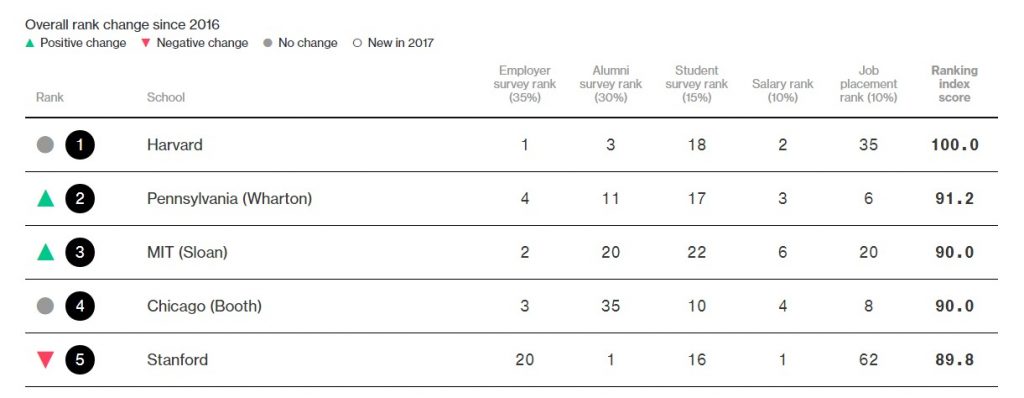Top Real Estate MBAs: Northwest

The Pacific Northwest is home to some of the fastest-growing cities in the country. According to the U.S. Census Bureau, Northwest real estate is rapidly expanding, with population increases (16.5-19.8 percent) in the these five metros:
- Greeley, CO
- George, UT
- Bend-Redmond, OR
- Provo-Orem, UT
- Boise, ID
While the Northwest is home to relatively few of the top-ranked MBA programs, the region makes up for a lack of quantity with quality—and specificity. Unbeknownst to many prospective b-schoolers pining for a tony school on the Eastern Seaboard, the American Northwest boasts a surprising number of excellent Real Estate-focused degrees.
Let’s take a closer look at the premiere options in the region:
The Top Northwest Real Estate MBA Programs

Located in Boulder, UC’s Leeds School of Business offers a traditional two-year full-time MBA with a real estate concentration. Noting its multi-disciplinary approach and the support of the CU Real Estate Center, the Leeds MBA real estate concentration offers a curriculum organized by industry focus, including the following courses:
- Sustainability & Real Estate
- Real Estate Finance
- Entrepreneurial Real Estate
In addition, the program offers a combination of “networking events, personal mentoring, conferences and competitions” to aid their MBA students in building their real estate industry careers. Annual tuition for in-state residents is $35,782, while out-of-state students can expect to pay $66,600.

Founded in 1908, the University of Denver Daniels College of Business organizes its MBA curriculum around a series of challenges that run concurrently with classes to provide students with a continually applied learning experience.
Students design a growth plan to monitor themselves so they can optimize their education and performance. Daniels offers a two-year, full-time MBA with a concentration in “Real Estate and the Built Environment.” With a customizable curriculum, annual tuition is $90,400.

Portland State University offers a Master’s of Real Estate Development that functions as an interdisciplinary program with PSU’s School of Business Administration, the School of Urban Studies and Planning, and the Center for Real Estate.
With 12-month full-time and 24-month part-time options, the curriculum includes courses in real estate fundamentals, a real-world capstone development project, fast tracks to professional licenses, and exposure to examples of sustainable urban development.
Annual tuition for in-state students is $37,800 full-time and $39,162 for out-of-state students, with residents of certain western states potentially eligible for tuition through WICHE and WRGP. Non-resident tuition is $45,555 full-time and $46,917 part-time for out-of-state students.

Nestled in the foothills of the Wasatch Mountain Range just outside of Salt Lake City, the University of Utah’s David Eccles School of Business offers a Master of Real Estate Development that emphasizes hands-on learning informed by and contributing to the research through the Ivory-Boyer Real Estate Center.
Students also have access to competitions such as the Utah Real Estate Challenge, weekly real estate labs, and professional mentorships. Study abroad opportunities and flexible, work-compatible schedules are also available. Annual tuition for Utah residents is $43,200 full-time and while non-residents can expect to pay $71,900.

In the University of Washington Foster School of Business full-time MBA program, students can take up to 16 credits worth of courses that are “non-MBA” coursework, of which includes real estate courses via the university’s College of Built Environments.
While some non-MBA courses at UW require pre-approval, the real estate course options do not require a a Non-MBA Class Request form. The total cost (tuition and fees)of the full-time program at UW’s Foster School of Business is currently $66,654 for in-state residents, and $96,666 for out-of-state residents. Prices are subject to change annually.
Harvard Business School Tops Bloomberg Businessweek Ranking

For the third straight year, Harvard Business School reigned supreme in the annual Bloomberg Businessweek “Best Business Schools” ranking, topping the Wharton School at the University of Pennsylvania and MIT Sloan School of Management. In joining HBS on the medals podium this year, those schools both saw significant gains over last year, climbing from sixth and seventh respectively.
Rounding out the top five this year is the University of Chicago Booth School of Business —holding steady year over year at fourth—and Stanford Graduate School of Business, which fell from second place in 2016 to fifth this year.

The methodology Bloomberg Businessweek uses to arrive at its annual MBA ranking involves weighting each of five principle factors. Employer surveys account for 35 percent of a school’s score. Alumni surveys account for another 30 percent. And a combination of current student surveys, salary rankings, and job placement together account for the remaining 35 percent of the final score.
High Risers
Ten out of the top 20 ranked schools in the 2017 Bloomberg Businessweek ranking advanced at least one spot over last year. Wharton and Sloan each managed to leap four spots, boosted by high praise from employers and hefty salary benefits for recent graduates. The University of Washington Foster School of Business also managed to jump from 19th to 15th overall this year, thanks largely to its top ranking as the nation’s best business school for job placement.
The Cornell S.C. Johnson Graduate School of Management and the UCLA Anderson School of Management both saw a rankings jump of three spots, with Johnson moving up to 13th and Anderson coming in at 19th.
The year’s biggest winner, however, may be the Penn State Smeal College of Business, which jumped a whopping 12 spots from last year’s 37th to come in at 25th in 2017. It wins the award for the year’s biggest overall rankings increase. The USC Marshall School of Business also saw a momentous climb this year, sidling up eight spots from 38th last year to 30th this year.
In the latter half of the rankings came another one of this year’s biggest risers, with the Terry College of Business at the University of Georgia jumping 11 spots from last year, up from 65th overall to 54th. Elsewhere, the David Eccles School of Business at the University of Utah, the Whitman School of Management at Syracuse University, the C.T. Bauer College of Business at the University of Houston, and the Pepperdine University Graziadio School of Business and Management all saw a jump of at least seven spots in the new ranking.
Once Mighty, Now Fallen
Stanford GSB, Duke’s Fuqua School of Business, Dartmouth’s Tuck School of Business, and Jones School of Business at Rice University may all be feeling a wee bit dizzy. Last year Stanford shot up to second from seventh the year before, but this year it finds itself demoted to fifth. Duke’s Fuqua School, which last year celebrated a momentous jump from eighth to third, this year fell back down to seventh. Dartmouth’s Tuck School of Business, which had one of last year’s biggest gains, rocketing up nine spots to break into the top five from a mere 14th place finish the year before, this year finds itself at seventh. Similarly, Rice Business, as the Jones School likes to be called, which last year catapulted 11 spots to number eight, this year slipped to tenth. But at least all maintained their footing within the top 10.
Emory’s Goizueta Business School and the Texas A&M Mays Business School, for their part, slipped out of the top 20 altogether. Goizueta slipped just slightly, from 20th to 21st, and Mays slid from 18th to 22nd. The University of Virginia Darden School of Business also stumbled, slipping from 12th last year to 17th this year. But the Charlottesville school at least managed to remain in the top 20, thanks in part to strong scores in the student survey and salary categories.
No school, however, lost more ground than the George Washington University School of Business, which fell an eye-popping 14 spots from last year, losing its place among the top 50 business schools in the United States.
Bloomberg BW has made multiple changes to its methodology in recent years, resulting in significant volatility in terms of where schools fall on the list even when not much has changed year over year at the individual schools themselves. This has led many to question the credibility of the ranking overall. That said, Clear Admit’s Alex Brown found this year’s results easier to swallow than some in recent years. “This ranking seems more reasonable to me this year,” he says. “Each of the M7 programs are in the top 10, and the schools I would consider in the top 16 are all in the top 20.”
You can view the complete 2017 Bloomberg Businessweek rankings here.
